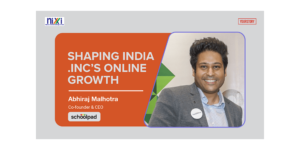Startups have never done as much hiring as they do today and have never spent as much money doing it
21st-century hiring demands an agile, enterprising and self-improving hiring manager who adapts to the changing times and needs
This article explores what’s wrong with a startup’s current recruiting process and how hiring managers can fix it
Startups have never done as much hiring as they do today and have never spent as much money doing it. The first reason is that the pandemic has spurred a wave of digitalisation across the globe, creating millions of job openings. The second reason why hiring is so challenging and costly is that talent pools have shrunk and retention has become tough. Consequently, the overburdened recruiter struggles to match this unprecedented demand with a meagre supply.
Recruiters spend hours scouring through LinkedIn profiles and social media for potential candidates. When applications arrive, they glare at their screens, overwhelmed with a slew of resumes, mostly from unskilled candidates. To sort through the deluge of applicants, recruiters test their skills, personality and IQ and interview them extensively. The process stretches weeks before the winning candidate is offered the job. This article explores what’s wrong with such a recruiting process and how hiring managers can fix it.
Revamp The Interviewing Process
From scheduling interviews to conducting multiple rounds, the interviewing process consumes most of the hiring managers’ time and efforts. Although hiring managers rely on interviews to gauge the best cultural fit and predict good hires, the process can sometimes prove ineffective. This is mainly because the vagaries and bias of the interviewer may unknowingly seep into the process.
By leveraging AI and automation to schedule interviews, adopting asynchronous video interviews for preliminary rounds and standardising the face-to-face meetings, hiring managers can accelerate the process, make it more inclusive and give rise to diverse organisations.
Upgrade Hiring Technologies
Despite ubiquitous digitisation since the pandemic, many startups continue to use outdated ATS (Applicant Tracking System) or CRM (Customer Relationship Management). Hiring managers desperately need new technologies and tools because the existing ones are ineffective.
As the startup grows and hiring volume increases, hiring managers should transition to sophisticated hiring technologies to keep up with the pace. At the same time, hiring managers should ensure they are not using overly complicated technologies that cause needless delays. Hiring managers should technologies like AI algorithms to complement human intelligence to find and assess job candidates.
Streamline The Hiring Process
21st-century hiring managers are all too familiar with the time and efforts wasted on false resumes, fraud interviews, ineffective background checks and ghosting candidates. Add to that the difficulties that arise when gauging technical recruits.
To nip the problem in the bud, hiring managers can shorten the application process, automate interviewing, personalise communication, test and verify candidates externally and build a pipeline of pre-vetted candidates. Furthermore, collaborative hiring and technology can be key enablers in streamlining the hiring process.
Expand The Talent Pool
By limiting an organisation’s talent pool to the organisation’s geographical area, hiring managers also restrict their organisation’s capabilities and skills.
With remote and hybrid work models gaining currency worldwide, recruiters should look beyond their nearest talent pools and cast a wider net to include contractual employees, freelancers, working mothers and single parents in their talent pool.
This will not only widen the shrinking talent pool and bring them access to skilled talent but also make the hiring process more diverse and inclusive.
Use An End-To-End Digital Hiring Platform
Startups often deploy a mix and match of different hiring tools that usually don’t work well together and end up losing track of applications and candidates along the way. They need to plug the leaks in their hiring toolkit and optimise the hiring process.
Hiring managers should connect their diverse tools to a single system or collaborate with an end-to-end recruiting platform to meet their hiring needs. Collaborative hiring is one way to ensure hiring managers have access to a global pool of talent as well as the latest and most efficient hiring technologies.
Measure The Hiring Results
A business adage common to most startups is that they manage what they measure but more often than not, this maxim does not apply to hiring results. Few hiring managers know the channel that produces the best candidates at the lowest cost because they don’t track the hiring outcomes.
Consequently, with every subsequent hiring, they end up searching for candidates from ineffective channels, adding to their time and costs. A quarterly appraisal of the hiring outcomes, from channels to processes, can help hiring managers identify their most inefficient practices and improve upon them.
The Bottom Line
21st-century hiring demands an agile, enterprising and self-improving hiring manager who adapts to the changing times and needs. By identifying common pitfalls, tweaking hiring processes, harnessing efficient technologies and collaborating with digital hiring platforms, hiring managers can save their time and energy while making hiring more streamlined and successful.










